在程序开发时,我们有时遇到程序出错了,但不知道具体的原因,莫名其妙的就崩溃了,其实标准库提供了一个系统错误的库,我们可以使用这个system_error库来了解错误的提示。它不仅提供错误码code(),还提供错误类别category(),错误信息message()等相关接口。
成员函数
| (构造函数) | 构造一个 error_code (公开成员函数) |
| operator= | 赋值为另一 error_code (公开成员函数) |
| assign | 赋值为另一 error_code (公开成员函数) |
| 修改器 | |
| clear | 设 error_code 为 system_category 中的值 0 (公开成员函数) |
| 观察器 | |
| value | 获得 error_code 的值 (公开成员函数) |
| category | 获得此 error_code 的 error_category (公开成员函数) |
| default_error_condition | 获得此 error_code 的 error_condition (公开成员函数) |
| message | 获得此 error_code 的解释性字符串 (公开成员函数) |
| operator bool | 检查值是否非零 (公开成员函数) |
下面是具体的示例:
//error_code observers: value, category and message
#include <iostream> //std::cout, std::ios
#include <system_error> //std::system_error
#include <fstream> //std::ifstream
#include <string> //std::string
using std::cout;
using std::ios;
using std::endl;
using std::system_error;
using std::ifstream;
using std::string;
int main()
{
std::error_code code;
cout << "Code: " << code.value() << endl;
cout << "Category: " << code.category().name() << endl;
cout << "Message: " << code.message() << endl;
cout << "default_error_condition: " << code.default_error_condition().message() << endl;
cout << "bool: " << code.operator bool() << endl;
cout << "Hello World!" << endl;
return 0;
}
运行结果:
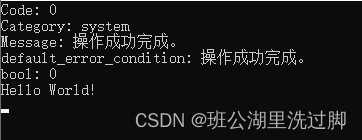
上面是创建一个error_code 对象,程序正常运行,根据上面的结果可以看没程序正常没有错误。
下面我们来看一个异常的程序。
//error_code observers: value, category and message
#include <iostream> //std::cout, std::ios
#include <system_error> //std::system_error
#include <fstream> //std::ifstream
#include <string> //std::string
using std::cout;
using std::ios;
using std::endl;
using std::system_error;
using std::ifstream;
using std::string;
int main()
{
ifstream is;
is.exceptions(std::ios::failbit);
try {
is.open("unexistent.txt");
} catch (const std::system_error &e) {
cout << "Exception caught (system_error):n" << endl;
cout << "Error: " << e.what() << endl;
cout << "Code: " << e.code().value() << endl;
cout << "Category: " << e.code().category().name() << endl;
cout << "Message: " << e.code().message() << endl;
cout << "default_error_condition: " << e.code().default_error_condition().message() << endl;
cout << "bool: " << e.code().operator bool() << endl;
cout << endl;
}
cout << "Hello World!" << endl;
return 0;
}
运行结果:
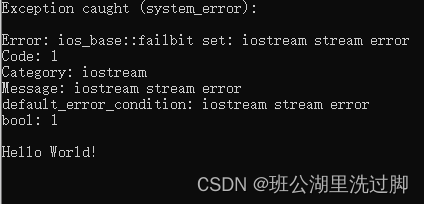
打开一个不存在的文件,出现了异常,从上面的异常提示我们知道这是输入输出流错误。
接着,我们把这个错误对象赋给第一个程序创建的一个空的错误类对象。查看他的信息。
//error_code observers: value, category and message
#include <iostream> //std::cout, std::ios
#include <system_error> //std::system_error
#include <fstream> //std::ifstream
#include <string> //std::string
using std::cout;
using std::ios;
using std::endl;
using std::system_error;
using std::ifstream;
using std::string;
int main()
{
std::error_code code;
cout << "Code: " << code.value() << endl;
cout << "Category: " << code.category().name() << endl;
cout << "Message: " << code.message() << endl;
cout << "default_error_condition: " << code.default_error_condition().message() << endl;
cout << "bool: " << code.operator bool() << endl;
cout << endl;
ifstream is;
is.exceptions(std::ios::failbit);
try {
is.open("unexistent.txt");
} catch (const std::system_error &e) {
cout << "Exception caught (system_error):n" << endl;
cout << "Error: " << e.what() << endl;
cout << "Code: " << e.code().value() << endl;
cout << "Category: " << e.code().category().name() << endl;
cout << "Message: " << e.code().message() << endl;
cout << "default_error_condition: " << e.code().default_error_condition().message() << endl;
cout << "bool: " << e.code().operator bool() << endl;
cout << endl;
// operator= 操作
code = e.code();
cout << "Code: " << code.value() << endl;
cout << "Category: " << code.category().name() << endl;
cout << "Message: " << code.message() << endl;
cout << "default_error_condition: " << code.default_error_condition().message() << endl;
cout << "bool: " << code.operator bool() << endl;
cout << endl;
}
cout << "Hello World!" << endl;
return 0;
}
运行结果:
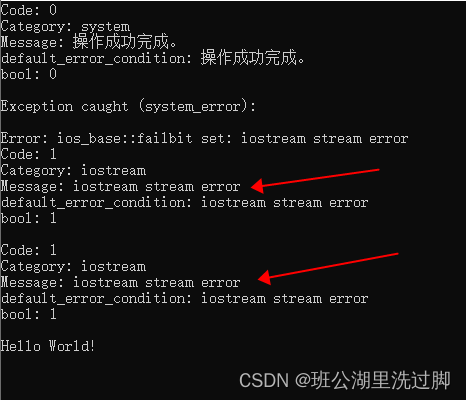
e和code两个错误对象的信息相同,接下来再调用clear函数,把信息内容清空
//error_code observers: value, category and message
#include <iostream> //std::cout, std::ios
#include <system_error> //std::system_error
#include <fstream> //std::ifstream
#include <string> //std::string
using std::cout;
using std::ios;
using std::endl;
using std::system_error;
using std::ifstream;
using std::string;
int main()
{
std::error_code code;
cout << "Code: " << code.value() << endl;
cout << "Category: " << code.category().name() << endl;
cout << "Message: " << code.message() << endl;
cout << "default_error_condition: " << code.default_error_condition().message() << endl;
cout << "bool: " << code.operator bool() << endl;
cout << endl;
ifstream is;
is.exceptions(std::ios::failbit);
try {
is.open("unexistent.txt");
} catch (const std::system_error &e) {
cout << "Exception caught (system_error):n" << endl;
cout << "Error: " << e.what() << endl;
cout << "Code: " << e.code().value() << endl;
cout << "Category: " << e.code().category().name() << endl;
cout << "Message: " << e.code().message() << endl;
cout << "default_error_condition: " << e.code().default_error_condition().message() << endl;
cout << "bool: " << e.code().operator bool() << endl;
cout << endl;
// operator= 操作
code = e.code();
cout << "Code: " << code.value() << endl;
cout << "Category: " << code.category().name() << endl;
cout << "Message: " << code.message() << endl;
cout << "default_error_condition: " << code.default_error_condition().message() << endl;
cout << "bool: " << code.operator bool() << endl;
cout << endl;
//调用clear()
code.clear();
cout << "Code: " << code.value() << endl;
cout << "Category: " << code.category().name() << endl;
cout << "Message: " << code.message() << endl;
cout << "default_error_condition: " << code.default_error_condition().message() << endl;
cout << "bool: " << code.operator bool() << endl;
cout << endl;
}
cout << "Hello World!" << endl;
return 0;
}
运行结果:
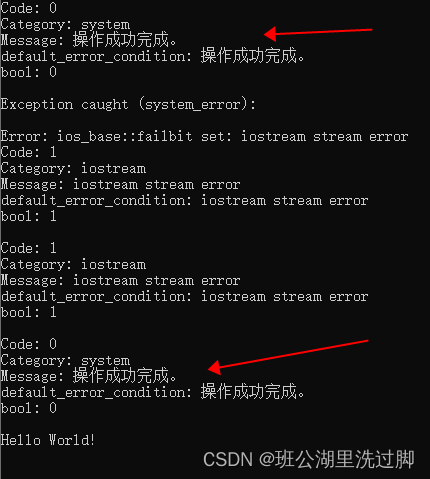
code对象又恢复到初始状态了。
我们也可以对错误码对像进行hash:
//error_code observers: value, category and message
#include <iostream> //std::cout, std::ios
#include <system_error> //std::system_error
#include <fstream> //std::ifstream
#include <string> //std::string
using std::cout;
using std::ios;
using std::endl;
using std::system_error;
using std::ifstream;
using std::string;
int main()
{
ifstream is;
is.exceptions(std::ios::failbit);
try {
is.open("unexistent.txt");
} catch (const std::system_error &e) {
cout << "Exception caught (system_error):n" << endl;
cout << "Error: " << e.what() << endl;
cout << "Code: " << e.code().value() << endl;
cout << "Category: " << e.code().category().name() << endl;
cout << "Message: " << e.code().message() << endl;
cout << "default_error_condition: " << e.code().default_error_condition().message() << endl;
cout << "bool: " << e.code().operator bool() << endl;
cout << endl;
std::hash<std::error_code> hashErrorCode;
cout << "hash(error_code): " << hashErrorCode(e.code()) << endl;
}
cout << "Hello World!" << endl;
return 0;
}
运行结果:
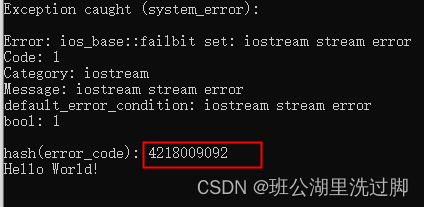
hash这是一个结构体模板,它不仅可以对错误码对象进行hash也可以对数值进行hash,比如int, long long, float, double,string等,下面来看一个示例:
//error_code observers: value, category and message
#include <iostream> //std::cout, std::ios
#include <system_error> //std::system_error
#include <fstream> //std::ifstream
#include <string> //std::string
using std::cout;
using std::ios;
using std::endl;
using std::system_error;
using std::ifstream;
using std::string;
int main()
{
ifstream is;
is.exceptions(std::ios::failbit);
try {
is.open("unexistent.txt");
} catch (const std::system_error &e) {
cout << "Exception caught (system_error):n" << endl;
cout << "Error: " << e.what() << endl;
cout << "Code: " << e.code().value() << endl;
cout << "Category: " << e.code().category().name() << endl;
cout << "Message: " << e.code().message() << endl;
cout << "default_error_condition: " << e.code().default_error_condition().message() << endl;
cout << "bool: " << e.code().operator bool() << endl;
cout << endl;
std::hash<std::error_code> hashErrorCode;
cout << "hash(error_code): " << hashErrorCode(e.code()) << endl;
string str = "hello world!";
std::hash<string> hashStr;
cout << "hash(string): " << hashStr(str) << endl;
int n = 100;
std::hash<int> hashN;
cout << "hash(int): " << hashN(n) << endl;
long long ln = 100;
std::hash<long long> hashLn;
cout << "hash(long long): " << hashLn(ln) << endl;
double dou = 100;
std::hash<double> hashD;
cout << "hash(double): " << hashD(dou) << endl;
float f = 100;
std::hash<float> hashF;
cout << "hash(float): " << hashF(f) << endl;
}
cout << "Hello World!" << endl;
return 0;
}
运行结果:
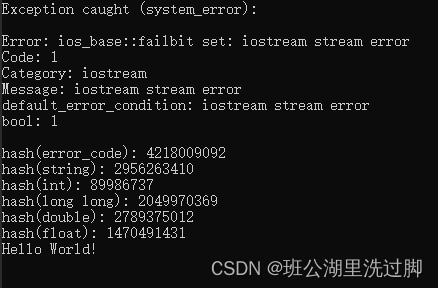
参考:
<system_error> - C++ Reference
标准库头文件 <system_error> - cppreference.com
最后
以上就是负责眼睛最近收集整理的关于system_error错误处理库学习的全部内容,更多相关system_error错误处理库学习内容请搜索靠谱客的其他文章。







![[踩坑笔记]C++之单线程下成功,多线程下失败](https://www.shuijiaxian.com/files_image/reation/bcimg11.png)
发表评论 取消回复